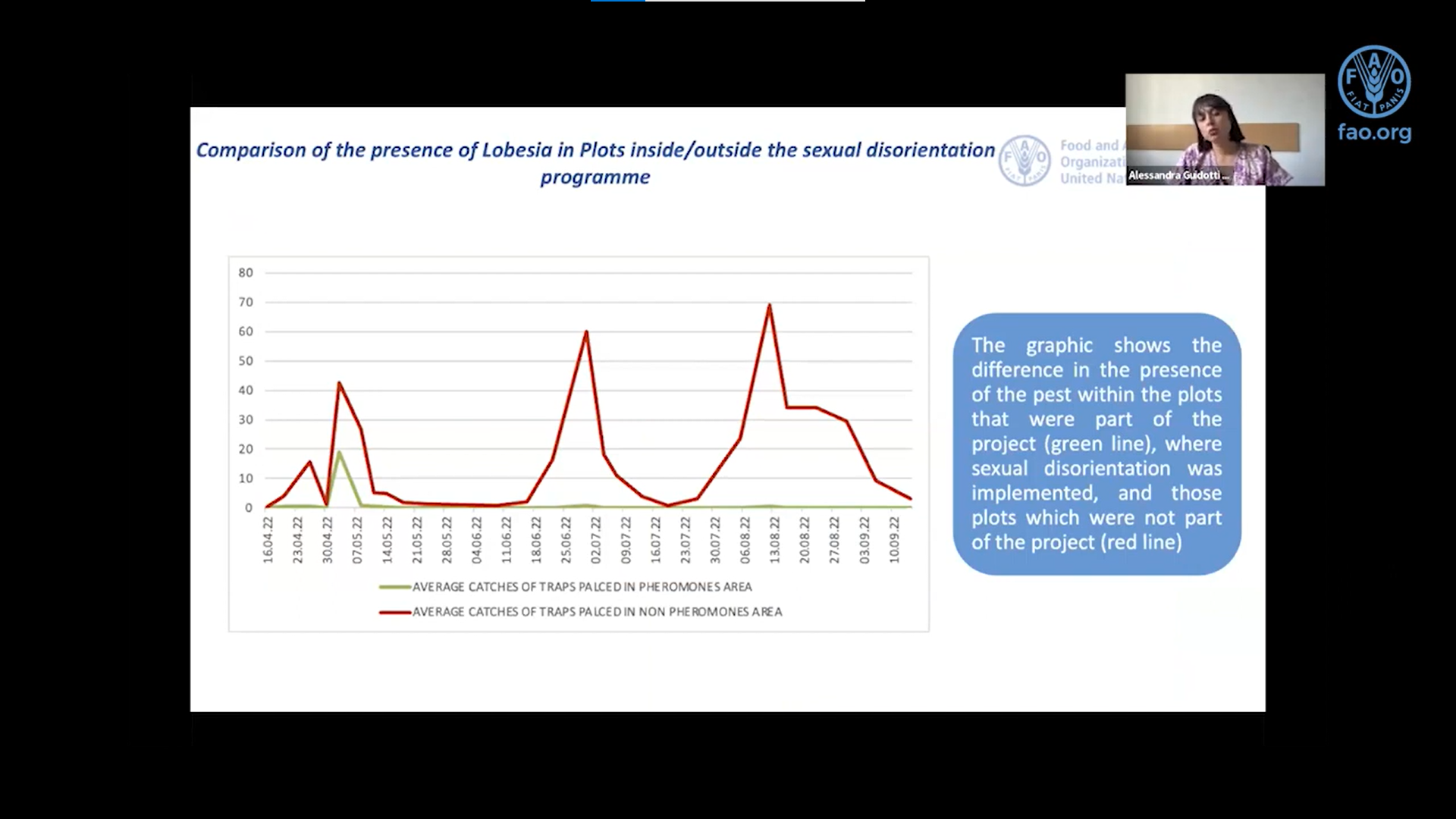News
OCOP webinar: biocontrol against pests to optimize grapevine production in Georgia and minimize negative environmental impacts

Local Saperavi grapevine variety in Georgia
©FAO/Guido Agostinucci
Rome, 26 May 2023 – The European grapevine moth (Lobesia botrana), is a highly damaging pest, which has a significant impact on vineyards, resulting in the destruction of up to 40 percent of the harvest in Georgia. Moreover, it exacerbates fungal infections that lead to a considerable decline in the quality of grapes produced. This pest alone significantly reduces the profitability of vineyards. A project led by the FAO Office in Georgia, financed by the European Union, has successfully piloted a Mating Disruption Technique, which consists of releasing pheromones in the vineyards so that male moths are less able to find the female moths to reproduce. The pest control approach may seem unfamiliar at first, but it is yielding excellent results with reduced damages, decreased use of pesticides and a higher quality product. This intervention was a response to Georgian grape producers and winemakers who had highlighted this pest as a priority to address, due to the estimated average losses between 20-30 percent in 2021.
Sharing the outputs of this biocontrol technique was the main objective of the first webinar under the One Country One Priority Product Initiative (OCOP), as the Government of Georgia has chosen wine as its Special Agricultural Product (SAP). The case study of Mating Disruption in Georgia shows how the use of biocontrol techniques can be beneficial for priority products like wine. Targeted sustainable development interventions such as this can be made under the OCOP to make improvements along the entire food value chain in Georgia and other countries around the world. The slides presented and a recording of the webinar will be shortly available on the resources page of the OCOP website through the link below.
Outline of biocontrol using sexual confusion
Traditional pest management techniques, such as pesticide spraying, have proven to be insufficient to effectively control Lobesia botrana, while adding significant environmental and food safety risks caused by the overuse of hazardous pesticides such as chlorpyrifos. The Mating Disruption Technique method involves releasing artificial pheromones in vineyards. By saturating the environment with these artificial pheromones, the mating process of the adults is disrupted. Using this technique correctly significantly minimizes the number of eggs laid and therefore the larvae damaging the grapevines during the growing season. Over time, it halts the spread of the grapevine moth.
European grapevine moths (Lobesia botrana) ©Ben Sale from UK, CC BY 2.0, via Wikimedia Common
Enthusiasm for the first of many OCOP webinars and broad commitment to the sustainable development of Georgian wine
The initiative shown by the FAO Country Office in Georgia was commended by Jingyuan Xia, Director of the FAO Plant Production and Protection Division, in his opening remarks. He also mentioned that this first webinar under the OCOP Initiative could serve as a good example which other FAO Country Offices can follow. Raimund Jehle, FAO Representative for Georgia, underlined that Georgia has prioritised wine within OCOP. Georgia is proudly considered to be a part of grapevine domestication, which originates from the Transcaucasia that ranges from the Black Sea to Iran. A multitude of local endemic varieties and traditional winemaking techniques, all of which make Georgian wine a unique product. Hafiz Muminjanov, OCOP Global Coordinator, presented an update on the overall progress of the Initiative since its global launch in September 2021. Next, Javier Sanz Alvarez, Programme Coordinator at the FAO Country Office in Georgia, explained the background of FAO’s work under the ENPARD programme, funded by the European Union, that frames the work on biocontrol for wine production.
Technical details from the biocontrol case study
Different perspectives on the use of pheromones to protect vineyards were presented by Julio Prieto Diaz, FAO Technical Expert. Alessandra Guidotti, FAO International Agronomy and Extension Specialist based in the FAO Country Office in Georgia and Patrick Honnef, the Technical Director at Chateau Mukhrani, a private wine company in Georgia, explained the excellent results achieved and the high interest of the private sector in continuing the work.
Julio Prieto Díaz explains how |
Alessandra Guidotti presents promising results |
The technical presentations illustrated how this sustainable agricultural technique works, with data from the field and listing the opportunities and challenges that they encountered. This biocontrol case study also presented promising results of reduced use of pesticides, reduction of losses and improved quality of wine produced, with increasing profitability year-on-year. Local winemakers have taken notice of these good results and a growing number are adopting the technique for themselves. For example, Chateau Mukhrani will use its own funds to carry on with this technique. Overall, the project escalated the surfaces adopting this technique from 200 ha in 2022 to 550 ha in the 2023 growing season, demonstrating the high interest of producers. Meanwhile, the percentage of support provided to the companies by FAO was reduced from 42 percent to only 8 percent of the total cost. Several other Georgian winemakers are adopting these biocontrol measures, which shows how setting an example of sustainable development that focuses on a priority product can influence others to adapt their practices for wider agrifood system improvements.
- Webinar recording and presentation slides on the OCOP global website.
- Launch event and workshop kicks off OCOP country projects in Europe and Central Asia
- FAO in Georgia: EU and FAO support Georgian winemakers with international expertise
- European Neighbourhood Programme for Agriculture and Rural Development in Georgia

.jpg?sfvrsn=1d2d3dbc_1)

